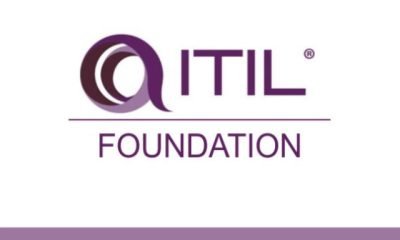Work
How Long Does an Employment Background Check Take? (10 FAQ Included)


Employment Background Check is one of the business industry’s best practices. A background check will run when a company is interested in hiring you for a position.
Table of Contents
Wondering What a Background Check Is?
If you have recently been into an interview with a company and feel it in your bones that they are considering hiring you, get ready for the background screening! They will thoroughly scann all your details, degrees, and records to ensure the firm is hiring the right person.
Employment background checks usually take place in the later stages of the interview. You can generally feel stuck in the moment, and this waiting period can get nerve-racking at times.
Feeling stranded in the same situation? Seeking answers to identity verification queries? Then, look no further because this article covers all the aspects of how long it might take for a background investigation.
How Long Do Pre Employment Background Checks Take?
A background check for employment purposes is essential for business. A pre-employment screening can take anywhere between 2-5 business days on average. Sometimes it might take a week or two, so you need to keep calm.
A criminal record check will take a week or two, and for a government job, it can take 3-5 business days.
Applying for the FBI means they will be carrying out a thorough and extensive checkup. Don’t expect a call back before 25-30 days for an FBI pre-employment screening as these are higher-level government jobs.
“The only way to do great work is to love what you do. If you haven’t found it yet, keep looking. Don’t settle.” — Steve Jobs
What Are They Looking for in a Background Check
While you wait for a call back, you might be curious about what shows up on a background check? Here are some things they will be checking:
- Criminal Records: This is the most crucial part of hiring because the employees want to make sure they are hiring the best. A clear criminal record is vital before the company can make an offer. If you have any criminal records, the chances of you getting hired might be low.
- Education: Many companies will verify your updated academic records that you have listed on your resume. So they can make sure all the degree are authentic and accurate. In case your degrees are not trustworthy or verified, you might not hear back from the company, and it might also land you into trouble.
- Your Employment history: Many companies look for your experience in the field you expertise or the job type they are offering. Majority of the candidates mention their past employment histories; thus the hirers need to make sure that all the work records are accurate and that you have really worked with the company you have mentioned.
They make cross-checks with the companies you have worked before which can take time to reach.
Why Is Your Background Check Taking So Long? Common Reasons for Delay
Has it been longer than two weeks? Such ong time is an indication that there might be some issues in your background screening. Here are some common reasons for the delay:
- The company you applied in is having difficulties in getting in touch with your former employers. The company might not be able to contact your academic institutions from where you got your degrees. Hence they are taking time for the degree verification process.
- If you are not a resident or an overseas employee, authorities may take time to respond. This might be because the verification request is taking longer to process. Gathering any pre-employment information from outside the USA can take more time than expected.
- Companies need to look through large databases to get your legal records. There are name variations, institutes, and employment records of thousands of people with a similar name to yours. Agencies need to double-check and cross-check that they are dealing with the right person and eliminate any confusion due to wrong information.
How to Speed Up Checks?
These ways will functionally work well:
- Make sure all the information you provide is complete and authentic from your end. All your verified degree documents, letters of resignations and legal documents must be at your avail. This will save your time and the agencies as well.
- An employer can speed up the process by giving the task of screening to agencies which work online as they are quicker in making and sending over the background check reports.
- Provide the company you are seeking a position in, with attested academic documents like your transcripts. You need to submit all the required documents for a hassle-free pre-employment screening.
10 Frequently Asked Questions
1. Should I Worry about a Background Check?
Background investigations hold a paramount of importance when you want to get hired. An applicant was restrained from being employed in Texas due to a minor offense that came up in his screening. While there is nothing you can do about it if you have any criminal records or you have added wrong information in your CV, in the future, you must stay out of such illegal acts.
2. How Can I Pass a Background Check?
Prepare yourself beforehand; make your own background check first. You must check on yourself first so that it does not take you by surprise. Check the following;
- Credit record
- Court and criminal records
- Driving records
- Academics and degrees
- Be honest because the background investigation will uncover all the details about you anyway. Lying can cost you the job you are applying to.
3. How Do I Know If I Passed My Background Check?
If you have passed, you might be notified through an email or a call. This will inform you that you have cleared the pre-employment screening and can join the job. Sometimes, a notification is sent verifying that you have passed the screening. A job offer often follows this.
4. Does A Background Check Mean I Have The Job?
A background check is undoubtedly an indication that a company is interested in hiring you, which is why they are running a pre-employment screening. However, it cannot be guaranteed until they officially send you a letter with a job offering or a job confirmation.
5. What Will Make You Fail A Background Check?
Several factors contribute to a failed background check, including:
- A bad credit history.
- You have a criminal record, and you are applying to a government job.
- The information you gave does not match your screening records.
- You were convicted of a crime at your previous workplace.
- Your academic information was incorrect.
6. Why Is My Background Check Still Pending for Job?
This may be because the checker is waiting for you to send some required documents to complete your report. You need to keep checking your mails. In some states, they still use paperwork for maintaining records; this is why it might take longer to make and send reports.
A Court backlog is another reason which occurs due to staff shortage and the increased demand for records asked. That is why your identity verification is being delayed and still pending for a job. Sometimes they are only reviewing your background check causing the delay.
7. What Happens If You Fail a Background Check?
Failing a background check usually means you will not get the job you have applied for. It is in your employer’s hands if they still want to hire you even if you have a criminal record. If you are lucky enough, the hirer might be willing to give you a chance to work despite the offense you have made.
“If opportunity doesn’t knock, build a door. ”
—Milton Berle
8. What If My Background Check Is Wrong?
If you have discovered that your background check is wrong, you have the right to file a dispute. Prepare your authentic documents to support your claim. Be honest and confident about what you think is wrong in your identity verification. The identity verification needs to be accurate as these really matter for hiring in reputable places.
9. What Does Level 1 Mean on a Background Check?
Level 1 is the basic background check every employer makes to ensure the correct personal details of the employee they are hiring. A level 1 background check means the hirer will check your date of birth, name, security number, and other basic details provided on the CV.
10. Will My Employer Disclose Why The Background Check Failed?
Yes, the employers always need to notify the employees about the failed background check. Employers take he adverse employment action on the basis of doubtful information uncovered from your screening.
Make sure you receive a copy from the employer of the background report so that you know the reason why you were not hired.
Final Thoughts
Background screening is an imperative part of the business sector. It helps employers pick out the best man for the job position and ensures that the person they are hiring is reliable. Pre-employment screening can take several days before the results come out due to multiple cross-checking processes.
For your processes to be quicker, make sure you never manipulate any information on your resume or application. Always speak the truth to avoid any confusion and keep your authentic documents handy in case of wrong background investigations.


Work
From Rookie to Veteran: Navigating the Career Path of a Long-Distance Trucker


Driving down the highway at sunrise, your eyes widen as endless miles of asphalt stretch ahead. Whether from one coast to another or back and forth across the country, long-distance trucking is a career choice with no shortage of adventure.
For new truckers just starting their career path, the journey ahead can seem daunting, yet those who have been in this line of work for years still find themselves captivated by its unique rewards and challenges. In this article, we will follow along the trail that veteran truckers take and offer a wealth of insight into navigating the career path of driving cross-country.
Understand the Landscape
The career path of a long-distance trucker can be a demanding and rewarding experience all at once. To navigate this ever-changing landscape, it’s essential to understand the ins and outs of the industry. While truckers face many challenges, such as fluctuating fuel prices and weather conditions, it’s also essential to consider the practicalities of life on the road.
One crucial factor is access to parking. Finding a reliable and safe truck parking lot near me can be a game-changer when planning trips and getting the needed rest. As with any career path, being prepared, adaptable, and motivated to succeed is essential. With a solid understanding of the trucking industry and a willingness to do what it takes, there’s no doubt that a career as a long-distance trucker can be fulfilling and lucrative.
Planning Ahead
As with any journey, planning is a crucial aspect of navigating the career path of a long-distance trucker. From carefully mapping out routes to considering rest stops and potential challenges, it’s crucial to have a solid plan before hitting the road. It not only ensures efficiency and safety but also helps to avoid unnecessary stress and delays.
In addition to planning routes and rest stops, it’s also vital for long-distance truckers to plan for their personal lives while on the road. It can include scheduling time to connect with family and friends, finding ways to stay healthy and fit, and setting aside funds for future retirement plans.
Time Management
One of the biggest challenges long-distance truckers face is managing time on the road. With strict delivery schedules and limited service hours, maximizing every minute on the job is crucial. It means finding efficient ways to load and unload cargo, being aware of traffic patterns and potential delays, and using technology to stay organized and on schedule.
Equally important is finding a healthy balance between work and personal time. Truckers can quickly become consumed by the demands of their job, but it’s important to prioritize rest to avoid burnout and maintain overall well-being.
Navigating Hazards & Challenges
The career path of a long-distance trucker has its hazards and challenges. From extreme weather conditions to mechanical issues, truckers must stay vigilant and prepared for whatever comes their way. It includes conducting regular vehicle inspections, staying up-to-date on weather reports, and planning for potential emergencies.
Mental health can also be a challenge for long-distance truckers, who may experience loneliness and isolation while on the road. Truckers need to take care of their mental well-being, whether it’s by connecting with loved ones back home or finding ways to stay engaged and entertained during downtime.
Communicating Effectively
Effective communication is vital to success in any career, and long-distance trucking is no exception. From communicating with dispatchers and other drivers on the road to maintaining a good relationship with clients, strong communication skills are essential for navigating this career path.
In addition to verbal communication, it’s also vital for truckers to be proficient in using technology for communication purposes. It can include GPS systems for navigation, electronic logging devices for tracking service hours, and apps for staying connected with loved ones back home.
Embracing the Journey
A career as a long-distance trucker is an ongoing journey with its own unique set of ups and downs. While it may not be for everyone, those who have found success and fulfillment in this line of work often credit their ability to embrace the journey and all that comes with it.
From rookie to veteran, navigating the career path of a long-distance trucker takes determination, adaptability, and a love for the open road. With the proper preparation and mindset, this career can lead to a fulfilling and rewarding journey that many find difficult to leave behind.
Perks & Benefits of Being a Trucker
While the career path of a long-distance trucker certainly has its challenges, many perks and benefits make it an attractive choice for those with a sense of adventure and a love for the open road.
One major perk is the potential for high pay and job security. With a shortage of qualified drivers in the industry, many trucking companies offer competitive salaries, benefits, and opportunities for advancement. Additionally, truckers often have a flexible schedule and can travel across the country, experiencing new places and cultures.
Another advantage of being a long-distance trucker is the sense of independence and self-reliance that comes with the job. While it’s essential to communicate effectively and work as part of a team, truckers also have the freedom to make decisions and take charge of their journeys.
Work
Understanding Commercial Cleaning: A Comprehensive Overview


While many of us are acquainted with residential and workplace cleaning, commercial cleaning may be a less familiar term. So, what exactly does it entail, and how does it differ from other cleaning services?
On the surface, the difference between domestic and commercial cleaning might seem straightforward. Yet, as businesses adjust to the new normal, it’s crucial to comprehend the myriad of cleaning services available to select the right one tailored to your establishment. Delving into the Different Types of Cleaning Contracts:
Domestic Cleaning
- Definition: Essentially, domestic cleaning refers to services aimed at maintaining homes and is generally contracted by the residents.
- Scope: Whether you’re an owner or a tenant, if you hire a service to manage tasks like window cleaning or installing internet, it’s still categorized as domestic cleaning. The usual services here include daily household chores, possibly extending to washing dishes or changing bed linens. Key tasks comprise dusting, vacuuming, and sanitizing kitchens and bathrooms.
- Special Note: For those adapting to the work-from-home culture, your home office still falls under the domain of domestic cleaning. However, suppose you operate a specialized business from your residence. In that case, you might require the expertise of commercial cleaners to maintain your professional environment optimally.
Commercial Cleaning
- Definition: The term ‘commercial cleaning’ is an umbrella phrase, covering cleaning services for various business premises, ranging from retail spaces to retirement homes.
- Tools and Specializations: Commercial cleaners are armed with a plethora of advanced equipment, such as floor buffers and industrial-grade cleaning tools. However, it’s noteworthy that commercial cleaning services Chicago can be highly sector-specific. For instance, the cleaning requisites of factories, data centers, and healthcare facilities differ substantially from those of entertainment venues like nightclubs. Several commercial cleaning firms narrow their focus to cater uniquely to these varied demands, channeling investments into specialized equipment and staff training to deliver optimal results.
Office Cleaning
- Focus Area: As implied by the name, office cleaning specializes in maintaining office environments. At a cursory glance, cleaning an office might seem rudimentary. However, offices are intricate spaces comprising fragile electronics, server rooms, pantries, restrooms, elevators, staircases, diverse surface materials, and a constantly moving populace.
- Complexity: This dynamic environment is a challenge to sanitize without causing disruptions. The continuous footfall impacts the longevity of office amenities. Over time, even durable office carpets can exhibit signs of wear and tear. Leveraging specialized commercial carpet cleaning can rejuvenate them, prolonging their lifespan and enhancing the ambiance and aroma of your workspace.
Evolving Workspaces: Is It Time to Reassess Your Cleaning Schedule?
As the global workforce pivots towards hybrid work models, combining remote and in-office work, businesses’ cleaning requirements are undergoing transformation. Certain enterprises might consider reducing their cleaning frequency due to decreased on-site staff. Conversely, some are intensifying their cleaning cadence as a protective measure against illnesses.
Even with diminished office attendance, the health risks remain—ranging from COVID-19 to other commonplace germs reintroduced as workers return. Therefore, in these evolving times, prioritizing cleanliness is paramount, ensuring a gradual and secure reintroduction to the workplace for everyone.
Work
Workplace Accidents Have Significant Costs for Businesses


Businesses put a lot of effort into building and maintaining a great reputation, but it can only take an unfortunate incident to damage it. In the workplace, nothing comes before employees’ safety and well-being. Or at least this should be the norm in every organisation. Unfortunately, many ventures fail to understand the importance of having clear health and safety policies in place.
Not prioritising this aspect can lead to workplace accidents, which have costly consequences, including compensation claims, lost productivity, damaged property, and tarnished reputation. It’s worth noting that such incidents don’t only cause suffering to the injured worker – they also affect the bottom line of a business. Therefore, it’s crucial to take employees’ health and safety seriously and avoid the significant implications of workplace accidents on your company.
Safety failures have a considerable impact on workers
According to the ILO, around 340 million work-related accidents happen annually. If employees are injured, the human costs are significant. But the costs of replacing the injured employee aren’t to be neglected either. The workload of the individual must be shared among other team members, and although this may be manageable in the short term, it can cause stress in the long run if the worker’s recovery is lengthy. Ongoing absence requires replacement, but recruiting new talent can become difficult when your business’ reputation is damaged due to failures in health and safety practices.
Workplace accidents leave only one impression on employees: they are not valued. On the other hand, hiring new employees means allocating resources (namely time and money) to provide effective training for them. But more often than not, in-store colleagues are the ones to deliver this training, and unfortunately, this is inefficient, as they don’t have a detailed understanding of OSHA violations. In this situation, two scenarios are possible: either the training isn’t fully delivered, or the new recruits fail to comprehend it entirely. This only causes more health and safety issues, adding to the pressure on employees to carry out their duties.
Workplace accidents can affect customers’ experience, too
If an employee is injured, customers can also experience the effects of such an incident, impacting their loyalty to your business. Even if employees try to cover multiple tasks, they can still miss some of the most important ones. In a store, this could mean empty shelves due to employees’ lack of time to restock or waiting too long for a checkout because only a few cashiers are available. Or, the negative experience could simply be due to an interaction with a stressed employee. Customers can easily get frustrated if such things happen, likely determining them to look for a better experience elsewhere.
Investing in health and safety: where to start?
According to https://www.how-to-sue.co.uk/, as an employer, you owe a duty of care to your employees. In other words, you are legally obligated to ensure they always work in safe conditions. This is important if you want to run a lucrative business and ensure both employees and customers have a positive experience at your company. After all, you depend on them to succeed! Employees who feel that their well-being matters are more likely to stay committed to their work. Having a health and safety plan in place is key to creating a positive work culture and boosting employee morale, which in turn, will result in reduced turnover rates and increased productivity, saving your business money in the long term.
Businesses are under great scrutiny, and a workplace accident can instantly ruin their reputation. Investing in health and safety is a way to demonstrate that you prioritise the well-being of employees, thus protecting your reputation. Here are some actionable steps you can take to reduce workplace accidents at your company:
- Carry out a risk assessment. This means evaluating the possible risks and hazards in the workplace that may cause harm to employees and brainstorming solutions to reduce them. Risk assessments are crucial for all businesses, as they can not only protect employees but also save your business money.
- Conduct regular inspections. It’s important to inspect equipment on a regular basis, as this helps ensure everything works properly. For instance, in the construction industry, workers use heavy machinery, so conducting inspections regularly can save lives.
- Provide effective training. As a business, you must legally train your employees on health and safety practices. However, more often than not, ventures treat training as if it were nothing but a box-ticking exercise. Unfortunately, this has significant consequences. It’s crucial to take this aspect seriously and provide employees with effective training. For instance, you can use mobile learning to offer them informative and engaging content on the best safety practices.
- Offer personal protective equipment to employees. Personal protective equipment, or PPE, is necessary to reduce exposure to workplace hazards. This equipment can include gloves, face masks, hard hats, and high-visual clothing, and it’s very effective in decreasing workplace injuries.
- Encourage workers to report accidents. Accident reporting allows you to determine whether the safety measures in your company are working. Moreover, it enables you to investigate how an accident happens, so you can remediate the problem and prevent similar incidents in the future. However, it’s important to ensure the process is accessible and efficient and provide training to workers on how to report accidents.
- Promote open communication. In many instances, businesses don’t include employees when implementing health and safety practices. However, since they are directly impacted, involving them in the process is essential. So, you should encourage open communication at your company and ask for honest feedback on what is and isn’t working. Using surveys can be incredibly effective because you can easily disperse them to workers and tailor them to your needs, making it easy to collect and evaluate the results.
Takeaway
Workplace injuries have consequences for employees and employers alike, so safety is a critical investment every business needs to make to avoid costly consequences. Ventures that use their resources to ensure workplace safety do better than those that don’t, both on a financial and organisational level, so it only makes sense to prioritise this aspect.



 Health11 months ago
Health11 months ago6 Best Ways to Get Quality Sleep



 Social Media12 months ago
Social Media12 months agoLinda Yaccarino: Twitter’s New CEO from NBCUniversal



 Work11 months ago
Work11 months agoFive Things Employees Look for in a Job Role



 shopping12 months ago
shopping12 months agoEssential Tips for Buying Jewelry Online



 Tech12 months ago
Tech12 months agoWhat Are the Advantages of ITIL Foundation Certification for Organizations?



 Education9 months ago
Education9 months ago7 Tips for Writing Short Stories That Captivate and Resonate



 Entertainment11 months ago
Entertainment11 months ago5 Famous Gamblers and Their Most Memorable Quotes



 Business11 months ago
Business11 months agoHow to Design and Create a Poster from Scratch




















